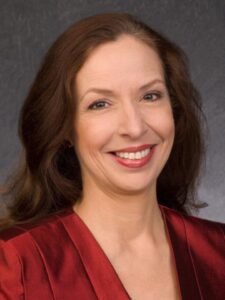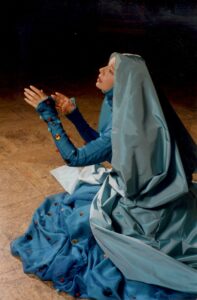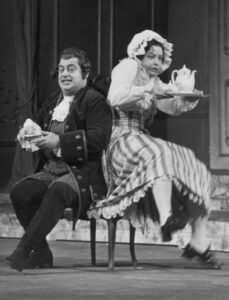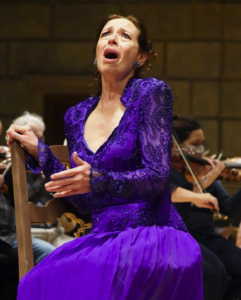A ‘music-infused’ life: mezzo-soprano Katherine Ciesinski ’18M (MS)
A ‘music-infused’ life: mezzo-soprano Katherine Ciesinski ’18M (MS)
The Martin E. and Corazon D. Sanders Professor of Voice at the Eastman School of Music says that teaching has been the fulfillment and greatest gift of her life

Katherine Ciesinski ’18M (MS), the Martin E. and Corazon D. Sanders Professor of Voice at the Eastman School of Music
Photo: Jim Caldwell
Since winning the Metropolitan Opera National Council Auditions at the age of 23, Katherine Ciesinski ’18M (MS) has achieved worldwide recognition as a performer and recording artist. The New York Times has called her a “singer of rare communicative presence, and a musician of discrimination and intelligence.”
In 2008, Ciesinski joined the faculty at the Eastman School of Music, where she is now the Martin E. and Corazon D. Sanders Professor of Voice. A decade later, she earned a master’s degree in medical humanities from the School of Medicine and Dentistry.
“Music has infused, inspired, and directed my life,” says Ciesinski. “I will sing and teach for as long as I can until it ceases to give me the great joy that it does.”
My family
My father, a Michigan native, was a World War II prisoner of war in Germany. He earned Purple Heart and Bronze Star medals for his service. My mother was in the USO. They met on a train on Long Island just after the war. They fell in love, married, and moved to Delaware where they raised me, my brother, Raymond, and my sister, Kristine, who also became an international opera singer. My parents were educators, and my father was also inducted into the Delaware Sports Hall of Fame for track and field coaching.
My childhood
My parents told me that I babbled musically to the radio when I was a baby. As a toddler, they couldn’t tear me away from the piano at my grandmother’s house (which soon made its way to our family’s living room). I sang in our church choir and throughout grade school, middle school, and high school. At an early age, my teachers recognized that I had perfect pitch.
My early training and career
I earned a bachelor’s and master’s in applied voice performance from Temple. After Temple, I went to Curtis Institute of Music for a three-year intensive opera certificate program. During that time, I went to a summer music academy in Salzburg, Austria—Mozart’s hometown. It was an eye-opening experience. International opera stars were treated like movie stars and every storefront featured life-sized portraits of them. After Curtis, I spent the summer in France and won major competitions in Geneva and Paris. Soon, I was performing at acclaimed opera houses and with leading orchestras around the globe.
My lucky breaks
When I was living in New York City in my early 30s, an opera company in Mexico called me, desperate. They were doing Samson and Delilah, and they needed a new lead, fast, to perform live and on TV with Plácido Domingo, the lead tenor who played Samson. I was given the score just a day or two before getting on a plane. I was awestruck by Plácido and all the talent there, and people were shocked I’d never performed this opera before.
My life as a teacher
In my heart and soul, I am a teacher. I enjoy the ardor, the problem-solving, and the experience of working with very talented students. Teaching allows for the full circle of what I’ve learned and practiced musically. It has been the fulfillment and greatest gift of my life to be a voice teacher, to be a conduit to advance the artistic abilities of others.
My interest in the medical humanities
To be a strong singer, I’ve always known that I must be a healthy person. At one point, I made a connection between why I sing and why others go into medicine. We share a desire and capacity to heal people. I started dreaming of a time when I could offer some understanding of the healing aspects of music to the medical community. I loved being in the inaugural class of the UR medical humanities program. I am currently interested in exploring long-haul COVID and how singing affects lung function.
My life today
My husband, Mark Powell ’19E (DMA), is a conductor who teaches at Queens College in New York City and commutes from Rochester. In the summers, I teach in Italy and Mexico. I also attend international music conferences throughout the year, where I sometimes present, and I chair Eastman’s voice, opera, and vocal coaching department. I serve my community in all these roles with great joy. Eastman is truly my home.
Photos through the years



Rochester Philharmonic Orchestra concert staging, November 2021
Hansel und Gretel, Mother
Photo: Tyler Cervini
This story also appears in the spring 2023 issue of Rochester Review.
Join us
To learn how you can support music and medicine, contact the Eastman School of Music’s or the Medical Center’s Advancement teams.
— Interview by Kristine Kappel Thompson, Spring 2023


